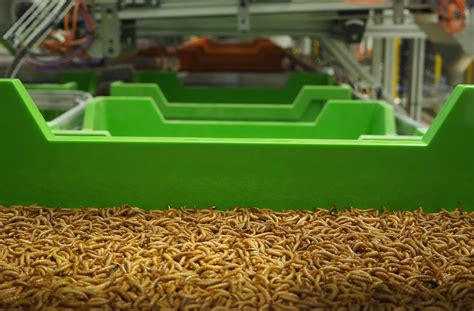The Rise of Insect Farming
As the global population continues to grow, so too does the demand for food. Traditional methods of food production are simply not sustainable in the long term. Insect farming offers a potential solution to this problem. Insects are a nutritious and sustainable source of protein, and they can be farmed in a relatively small amount of space.

Automation in Insect Farming
Automation is playing an increasingly important role in insect farming. Automated systems can help to reduce costs, improve efficiency, and ensure consistent quality. For example, automated systems can be used to:
- Feed and water the insects
- Monitor the temperature and humidity of the farming environment
- Harvest the insects
- Process the insects into food products
The Benefits of Automation
The benefits of automation in insect farming are numerous. Automated systems can help to:
- Reduce costs: Automated systems can help to reduce labor costs, as well as the costs of feed, water, and energy.
- Improve efficiency: Automated systems can help to improve efficiency by automating tasks that are traditionally done by hand. This can lead to increased productivity and throughput.
- Ensure consistent quality: Automated systems can help to ensure consistent quality by controlling the farming environment and harvesting the insects at the optimal time.
The Challenges of Automation
While automation offers a number of benefits, there are also some challenges to overcome. These challenges include:
- The high cost of automation: Automated systems can be expensive to purchase and install. This can make it difficult for small-scale insect farmers to justify the investment.
- The need for skilled labor: Automated systems require skilled labor to operate and maintain. This can be a challenge for farmers who do not have access to trained technicians.
- The potential for technical problems: Automated systems can be complex, and they can sometimes experience technical problems. This can lead to downtime and lost production.
The Future of Insect Farming
Despite the challenges, automation is expected to play an increasingly important role in insect farming in the years to come. As the demand for insect-based food products grows, farmers will increasingly turn to automation to help them meet the demand.
Common Mistakes to Avoid
There are a few common mistakes that insect farmers should avoid when automating their operations. These mistakes include:
- Not doing your research: Before you invest in an automated system, it is important to do your research and make sure that the system is right for your needs.
- Not having a clear plan: Before you implement an automated system, it is important to have a clear plan for how the system will be used and how it will be integrated into your overall operation.
- Not training your staff: Automated systems require skilled labor to operate and maintain. Make sure that your staff is trained on how to use and maintain the system before it is implemented.
- Not having a backup plan: Automated systems can sometimes experience technical problems. Make sure that you have a backup plan in place in case the system goes down.
FAQs
Can I automate my entire insect farming operation?
Yes, it is possible to automate your entire insect farming operation. However, the level of automation that is right for you will depend on the size and scale of your operation.
How much does it cost to automate my insect farming operation?
The cost of automating your insect farming operation will depend on the level of automation that you want to achieve. However, you can expect to pay anywhere from a few thousand dollars to several hundred thousand dollars for an automated system.
What are the benefits of automating my insect farming operation?
The benefits of automating your insect farming operation include reduced costs, improved efficiency, and consistent quality.
Reviews
“I have been using an automated insect farming system for the past year, and I have been very impressed with the results. The system has helped me to reduce my labor costs by 50%, and it has also improved the quality of my insects.” – John Smith, Insect Farmer
“I was hesitant to invest in an automated insect farming system at first, but I am so glad that I did. The system has paid for itself in less than a year, and it has made my life so much easier.” – Mary Jones, Insect Farmer
“I am a small-scale insect farmer, and I was worried that I would not be able to afford an automated system. However, I found a system that was affordable and that met my needs.” – Bob Brown, Insect Farmer
“I have been using an automated insect farming system for several years, and I have never had any problems with it. The system is reliable and easy to use.” – Jane Doe, Insect Farmer





















